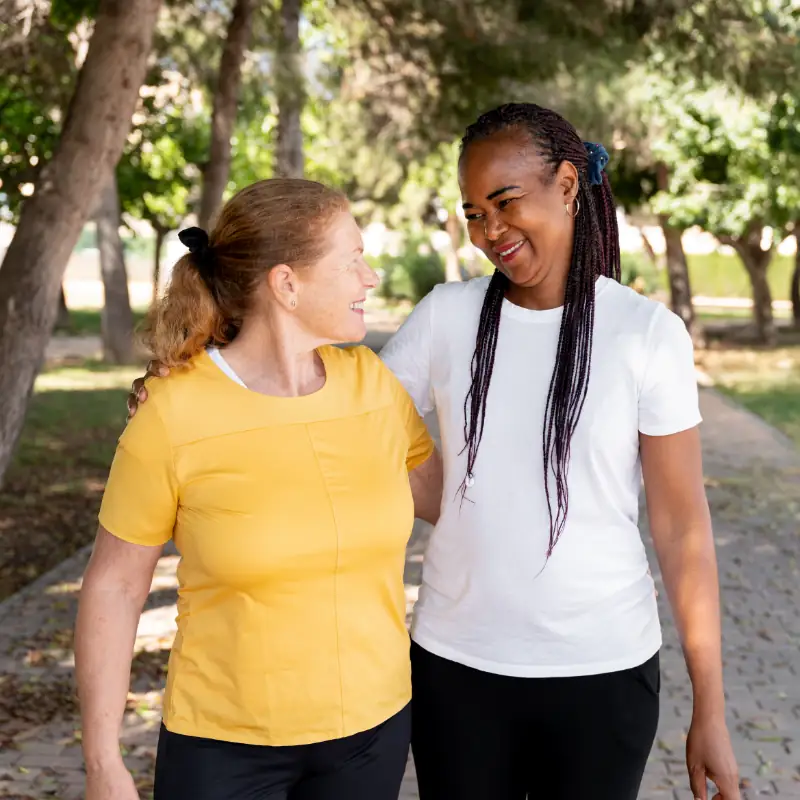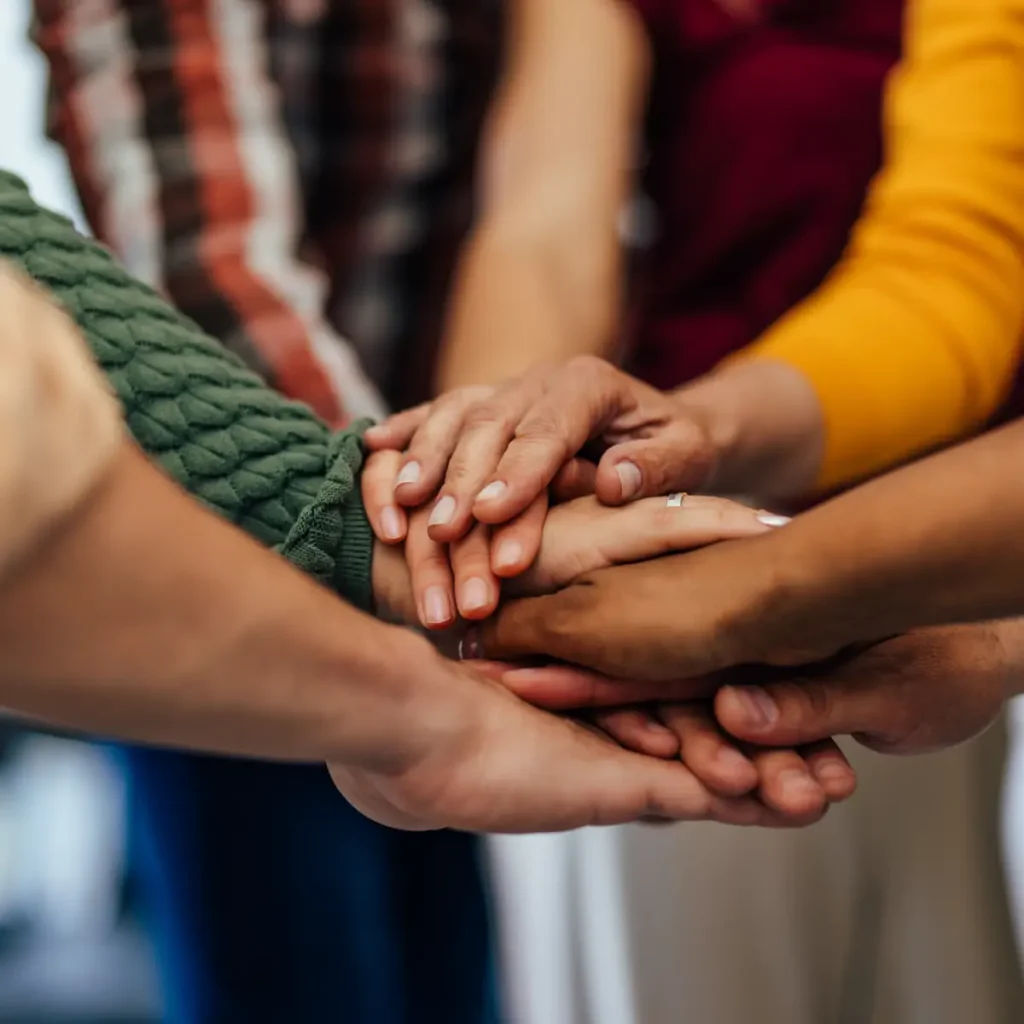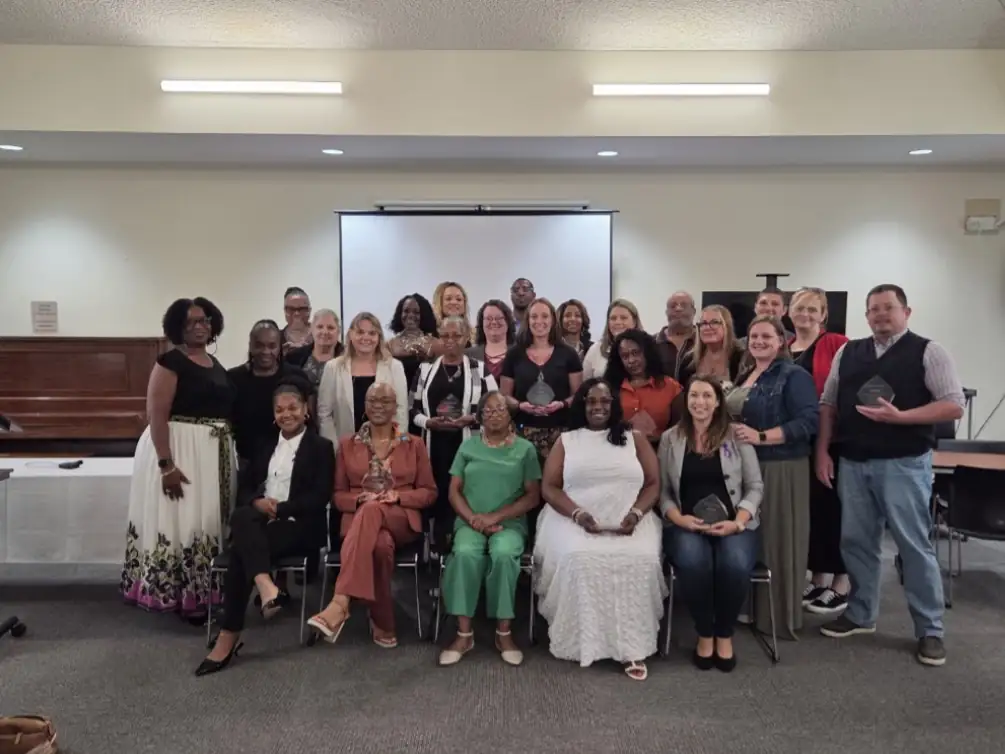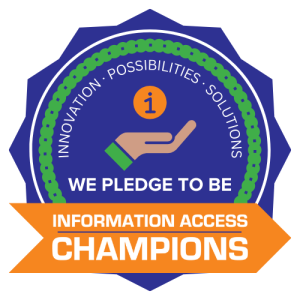Servicios de apoyo entre pares
Los servicios de apoyo entre pares son un recurso vital que DBHDS emplea para ayudar a las personas a recuperar de problemas de salud mental y / o uso de sustancias. Este modelo de atención basado en evidencia es brindado por proveedores calificados de apoyo entre pares que acompañan a las personas en su viaje de recuperación. Los servicios no son clínicos y están centrados en la persona, lo que significa que cada individuo es reconocido como único, con su propia perspectiva, fortalezas y preferencias. El apoyo a menudo incluye reuniones periódicas para la autoexpresión y el desarrollo de planes de recuperación personalizados con objetivos claros y medibles.
Los proveedores de apoyo entre pares logran la certificación y obtienen respaldos que reflejan sus habilidades, conocimientos y experiencia. Sus calificaciones se construyen a través de educación especializada, así como su propia experiencia vivida.
- Especialistas en recuperación de pares (PRS): Personas que se identifican a sí mismas como que vivieron una experiencia con un problema de salud mental y/o uso de sustancias.
- Socios de apoyo familiar (FSP): Personas que apoyaron a un familiar o ser querido con problemas de salud mental o uso de sustancias para navegar por el sistema de salud conductual.
La experiencia vivida es poderosa porque fomenta la empatía, la confianza y la conexión. Muestra que la recuperación es posible y que las personas no están solas en su viaje. El apoyo de pares demuestra que otras personas con experiencias similares lograron el bienestar, y que la esperanza, la curación y la recuperación son alcanzables para todos.

Vías de certificación y registro de Virginia PRS
Apoyo natural de pares
El apoyo entre pares se puede ofrecer de forma natural, ya que ocurre entre dos personas que comparten una experiencia común de la esperanza de recuperación de cualquiera de los muchos desafíos de salud mental o uso de sustancias. El apoyo natural entre pares se puede ofrecer sin capacitación formal o con una variedad de capacitación, antecedentes y conjuntos de habilidades. Las personas en esta categoría se llaman a sí mismas Especialistas en Pares, Entrenadores de Recuperación, Colegas de Apoyo, etc.
Especialistas en recuperación de pares
Los especialistas en recuperación de pares (PRS) son personas que completaron con éxito el proceso de certificación en Virginia. Esto incluye completar la capacitación de especialistas en recuperación de pares DBHDS de 72horas. Acumularon los requisitos necesarios, como 500 horas de experiencia en apoyo de pares y aprobar un examen, para calificar como Especialista Certificado en Recuperación de Pares (CPRS) con la Junta de Certificación de Virginia. Otra vía es acumular requisitos para la certificación como Especialista Nacional Certificado en Apoyo a la Recuperación de Pares (NCPRSS) con NADAAC. También podrían ser certificados por el proceso de la Administración de Veteranos.
Especialistas registrados en recuperación de pares
- CPRS Y NCPRSS deben registrar en la Junta de Consejería del Departamento de Profesiones de la Salud para que sus servicios se facturen a Medicaid. En este punto, se les conoce como Especialista Registrado en Recuperación de Pares (RPRS).
- Debe ser un CPRS o un NCPRSS.
- Completó con éxito la capacitación PRS de 72horas gestionada por DBHDS.
Especialista certificado en recuperación de pares (CPRS)
- Fue certificado por la Junta de Certificación de Virginia (afiliada a la Junta de IC&RC).
- Completó con éxito la capacitación PRS de 72horas gestionada por DBHDS.
- Para convertir en un socio de apoyo familiar, debe obtener esta calificación además de cualquier otra capacitación específica.
- Competencias básicas de los CPRS
- Capacitación en CPRS
Especialista Nacional Certificado en Apoyo a la Recuperación de Pares (NCPRSS)
- Certificado por la NAADAC, la Asociación de Profesionales de la Adicción (anteriormente llamada Asociación Nacional de Consejeros de Adicción al Alcohol y las Drogas)
- Completó con éxito la capacitación PRS de 72horas gestionada por DBHDS
Recursos adicionales de recuperación
- Red de especialistas en recuperación de pares de Virginia
- Alianza para la Recuperación del Abuso de Sustancias y Adicciones de Virginia
- Salud mental Virginia
- Alianza Nacional de Enfermedades Mentales (NAMI) Virginia
- Asociación de Liderazgo de Directores Ejecutivos Familiares (FREDLA)
- Administración de Servicios de Salud Mental y Abuso de Sustancias
- Departamento de Servicios para Veteranos (DVS)
Si tiene preguntas sobre estas certificaciones, la capacitación o cualquier problema relacionado, comunicar con Mary McQuown, Coordinador de Desarrollo de la Fuerza Laboral de Servicios de Recuperación.

Explosión de recuperación y memoria flash ORS
Actualizaciones por email sobre capacitaciones y certificaciones, eventos orientados a la recuperación, información sobre prácticas basadas en evidencia y otra información importante sobre recuperación.
Lista de distribución de email flash de AskORS
Si está interesado en ser agregado o eliminado de la lista de distribución de email, vaya a vaprs.org/recovery-blast/.
Si tiene preguntas sobre estas certificaciones, la capacitación o cualquier problema relacionado, comunicar con Mary McQuown, Coordinador de Desarrollo de la Fuerza Laboral de Servicios de Recuperación.
Academia de Liderazgo para la Recuperación (RLA)
Con los muchos desafíos que enfrenta la fuerza laboral de pares, es importante continuar desarrollando líderes para el futuro. DBHDS y el Departamento de Consejería de Rehabilitación de la Universidad Virginia Commonwealth ofrecen esta oportunidad única de desarrollo profesional a las personas en el campo de la recuperación entre pares. La Academia de Liderazgo de Recuperación (RLA) emplea una combinación de experiencias educativas, tutoría y un proyecto final de formación de equipos para preparar a la fuerza laboral de recuperación de pares para puestos de liderazgo.
Formato del programa
El programa de capacitación dura nueve meses. El primer mes se centra en las evaluaciones previas a la formación, seguidas de ocho meses de formación por parte de profesionales en el campo de la recuperación y la transformación de sistemas orientados al bienestar. Cada sesión de entrenamiento tiene lugar el segundo martes del mes entre enero y agosto. A lo largo del programa, los participantes practican habilidades de liderazgo seleccionadas en su lugar de trabajo y trabajan con un pequeño equipo para crear un Proyecto Capstone. Los participantes son emparejados con un mentor en abril. Todos los mentores son graduados de la RLA. Las sesiones de capacitación cubren las siguientes áreas de desarrollo de liderazgo: autoconciencia, sesgo inconsciente, retroalimentación, visión, estilos de liderazgo, formación de equipos, conocimiento político, forja de coaliciones, habilidades de presentación, una introducción a la redacción y evaluación de subvenciones, cambio de sistemas y cómo crear un proyecto y una propuesta final.
Los líderes emergentes (EL) participan en dos evaluaciones previas a la capacitación en enero: el indicador de tipo Myers Briggs y el inventario de inteligencia emocional. Los EL reciben comentarios individuales sobre las evaluaciones, y la primera sesión de capacitación incluye una discusión general de las evaluaciones, la autoconciencia y el sesgo inconsciente. También reciben una copia del libro Inteligencia Emocional 2.0 por Bradberry & Greaves.
¿Quién debe aplicar?
Personas que son Especialistas Certificados en Recuperación de Pares (CPRS), incluidos los Socios de Apoyo Familiar (FSP) o los Especialistas Certificados en Apoyo a la Recuperación de Pares Nacionales (NCPRSS).
- Personas que prestan servicios en organizaciones de recuperación y desean obtener o tienen actualmente una posición de liderazgo.
- Personas con experiencia vivida en el campo de la recuperación (salud mental y/o uso de sustancias) y exhiben profesionalismo, madurez y deseo de aprender.
- Personas que pueden comprometer con este desafiante programa.
¿Cómo puedo aplicar?
- El anuncio para la presentación de solicitudes para la cohorte anual de RLA sale en septiembre. El anuncio se envía a través de Recovery Flash, una lista de distribución de email. Para cerciorar de que está en esta lista, vaya a vaprs.org/recovery-blast/.
- Para comprender lo que se requiere para participar en el RLA, revise cuidadosamente este documento de muestra.
- Envíe todos los documentos antes de la fecha de vencimiento publicada.
Comparta esta información con todos aquellos colegas certificados que exhiben potencial de liderazgo y tienen tiempo para comprometer con este programa sobresaliente.
¿Preguntas?
Unir a nosotros para la sesión informativa de RLA el martes 22 de octubre a las 12pm.
Por favor, comparta esta información
… con todos aquellos que exhiben potencial de liderazgo y tienen tiempo para comprometerse con este programa excepcional.
Con los muchos desafíos que enfrenta la fuerza laboral de pares, es importante continuar desarrollando líderes para el futuro. El Departamento de Salud Conductual y Servicios de Desarrollo de Virginia y el Departamento de Consejería de Rehabilitación de la Universidad de Virginia Commonwealth ofrecen esta oportunidad única de desarrollo profesional a las personas en el campo de la recuperación entre pares. Desarrollada en colaboración con la Oficina de Servicios de Recuperación y el Comité Directivo de Liderazgo de las partes interesadas, la Academia de Liderazgo de Recuperación (RLA) emplea una combinación de experiencias educativas, tutoría y un proyecto final de formación de equipos para preparar a la fuerza laboral de recuperación de pares para puestos de liderazgo.





Números de teléfono y direcciones de email emitidos por DBHDS
María McQuown
Coordinador de Desarrollo de la Fuerza Laboral de Servicios de Recuperación
mary.mcquown@dbhds.virginia.gov
757 - 403 - 3007






